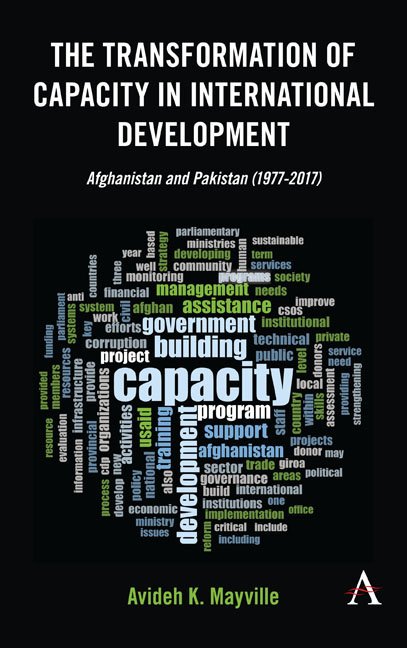Book contents
- Frontmatter
- Dedication
- Contents
- List of Figures
- Acknowledgments
- Chapter One Introduction
- Chapter Two Development Agendas and Donor Spaces: How Capacity Gained Salience
- Chapter Three Capacity in Development Policy and Practice: The Quest for Performance Excellence in the Governance of Disabling Environments
- Chapter Four Capacity and Fragility: The Sociological Framework for the Capacity Project and Developing “Fragile” States
- Chapter Five The Capacity Project in “AfPak”: Development Experiments, Subnational Spaces, and Transnational Networks
- Chapter Six The Battle for Power in Disabling Environments: Statecraft and Developing Capacity in Afghanistan and Pakistan
- Chapter Seven Developing Capacity to Manage Global Threats: Statemaking, the Militarization of Development, and Human Rights Approaches
- References
- Index
Chapter Seven - Developing Capacity to Manage Global Threats: Statemaking, the Militarization of Development, and Human Rights Approaches
Published online by Cambridge University Press: 11 December 2019
- Frontmatter
- Dedication
- Contents
- List of Figures
- Acknowledgments
- Chapter One Introduction
- Chapter Two Development Agendas and Donor Spaces: How Capacity Gained Salience
- Chapter Three Capacity in Development Policy and Practice: The Quest for Performance Excellence in the Governance of Disabling Environments
- Chapter Four Capacity and Fragility: The Sociological Framework for the Capacity Project and Developing “Fragile” States
- Chapter Five The Capacity Project in “AfPak”: Development Experiments, Subnational Spaces, and Transnational Networks
- Chapter Six The Battle for Power in Disabling Environments: Statecraft and Developing Capacity in Afghanistan and Pakistan
- Chapter Seven Developing Capacity to Manage Global Threats: Statemaking, the Militarization of Development, and Human Rights Approaches
- References
- Index
Summary
How local national staff managed to implement project activities in these areas (… with only a token security apparatus and no functional district government) … is still an open question … The explanation given, that they were able to leverage local knowledge and contacts, is in and of itself not a sufficient explanation. How they leveraged local knowledge and contacts is more to the point. This has not been sufficiently answered to allow for practical lessons learned and to help in establishing best practices for program delivery in insurgent controlled areas ….
— USAID Stability in Key Areas (SIKA) Final Performance Evaluation (USAID 2015b, 2)Now the great desire of the trans-border tribesman is, I take it, to maintain his religion and his independence. The British Government have not the smallest desire to interfere with either … The policy of the Government of India towards the trans-border men is very simple, and it is this. We have no wish to seize your territory or interfere with your independence. If you go on worrying and raiding and attacking, there comes a time when we say, This thing must be put an end to: and if the tribes will not help us do it, then we must do it ourselves. The matter is thus almost entirely in your own hands. You are the keepers of your own house. We are ready enough to leave you in possession. But if you dart out from behind the shelter of your door to harass and pillage and slay, then you must not be surprised if we return quickly and batter the door in.
— Lord Curzon, British viceroy and governor-general of India (1898– 1905) (Curzon 1906, 422)This project addresses a series of complex questions around how concepts such as capacity gain salience in donor spaces, the foreign policy priorities of donor states, and the rise of transnational militancy. By examining the transformation of capacity within the example of USAID frameworks and projects, I expose conceptual and discursive shifts that mask the political project of development, particularly as it pertains to threats to global security. Capacity development is now a permanent part of the lexicon of the development space.
- Type
- Chapter
- Information
- The Transformation of Capacity in International DevelopmentAfghanistan and Pakistan (1977–2017), pp. 191 - 218Publisher: Anthem PressPrint publication year: 2019



